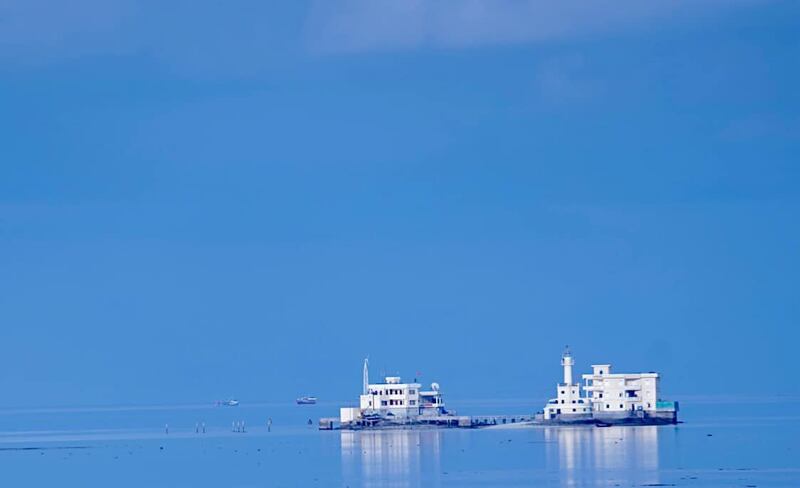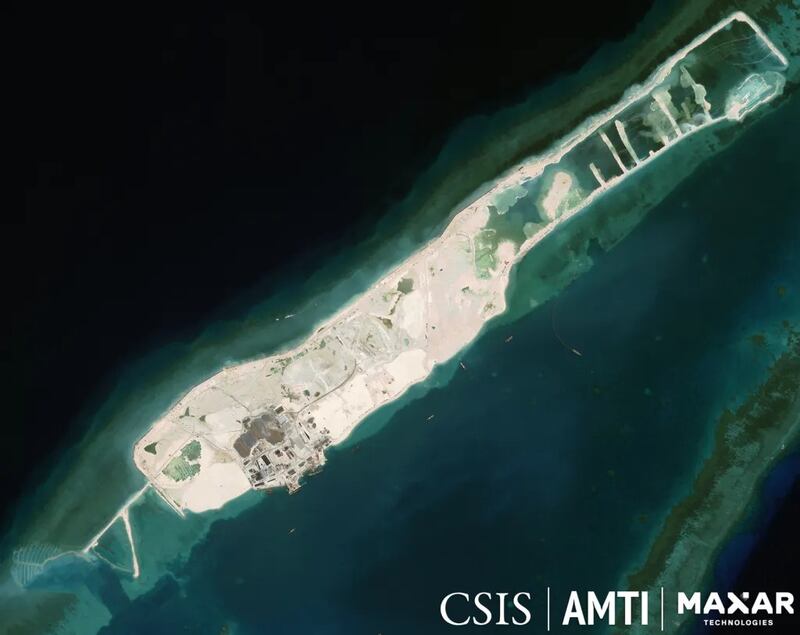Vietnam’s island building in the South China Sea has reached a record with the total new land created in the first six months of this year equaling that of 2022 and 2023 combined, a U.S. independent think tank said.
The Washington-based Asia Maritime Transparency Initiative (AMTI) said in its latest report that since November 2023, Vietnam has created 692 new acres (280 ha) of land across a total of 10 features within the Spratly archipelago.
In comparison, it created 404 acres (163.5 ha) of land in the first 11 months of 2023 and 342 acres (138.4 ha) in 2022.
Vietnam has reclaimed a total area of about half the area that China has built up, with much of Vietnam's work on reefs China also claims.
Of the two main island groups in the South China Sea, China occupies the Paracels, while the Spratlys, to the south, are contested by several countries.
Vietnam occupies 27 features and has been carrying out large-scale reclamation works on some over the past year.
Among the 10 largest features in the Spratlys, five are being developed by Hanoi, AMTI said. Vietnam’s features are much smaller than any of China’s so-called Big Three - Fiery Cross Reef, Mischief Reef and Subi Reef - artificial islands that Beijing developed and fully militarized.
Vietnam’s overall dredging and landfill totaled about 2,360 acres (955 ha), roughly half of China’s 4,650 acres (1881.7 ha).
The research group said Vietnam’s reclamation was a major change. Just three years ago, the total amount of Vietnamese dredging and landfill was less than a tenth that of China’s.
Vietnam’s work includes the Barque Canada Reef, or Bai Thuyen Chai in Vietnamese, where the area nearly doubled over six months, from 238 acres (96.3 ha) to 412 acres (166.7 ha), the group said.
Vietnam says little about its work at the features apart from it is to protect them but not to expand them or change structures. There was no immediate government response to the AMTI report.
Related Stories
[ Philippines ‘monitoring’ Vietnam’s South China Sea island buildingOpens in new window ]
[ Vietnam rapidly builds up South China Sea reefOpens in new window ]
[ Manila accuses Beijing of island building in South China SeaOpens in new window ]

Runway potential
Six months ago, Radio Free Asia reported on the rapid expansion of Barque Canada Reef from the end of 2021. Chinese think tank the South China Sea Probing Initiative had said Hanoi may be building a second airfield on the reef but the latest satellite imagery shows no sign of that.
Vietnam has one 1,300-meter runway on the Spratly Island, or Truong Sa Lon in Vietnamese, which can handle medium-sized military aircraft.
The Barque Canada Reef “measures 4,318 meters in length, which makes it the only Vietnamese outpost so far with the potential to host a 3,000-meter runway” like those that China has, the think tank said.
China’s three largest artificial islands are all equipped with runways that can accommodate bigger military transport, surveillance, and bomber aircraft.

Other features under Hanoi’s control that have undergone significant development since November 2023 are Discovery Great Reef, South Reef, Namyit Reef and Pearson Reef, according to the report.
Vietnam “has continued implementing a mix of cutter-suction and clamshell dredging”, AMTI researchers said.
A cutter suction dredger cuts the seabed into fragments with a rotating head. Material is sucked up by dredge pumps and discharged through pipes across sea and land.
Scientists say cutter suction dredgers are more environmentally destructive and China has been criticized for using them.
The Vietnamese public seems supportive of the island building. Many social media commentators hail “the right strategy” in the face of China’s assertiveness in the South China Sea.
Six parties – Brunei, China, Malaysia, the Philippines, Taiwan and Vietnam – claim parts of the South China Sea as well as the islands and reefs inside it but China’s claims are the most expansive.
A Philippine official, asked about Vietnam’s dredging and landfill work, said that Hanoi was reclaiming features that it occupied before a 2002 Declaration on the Conduct of Parties in the South China Sea.
“Vietnam focuses on minding their own affairs,” Philippine coastguard spokesperson Jay Tarriela told reporters.
“They do not engage in harassing our fishermen or illegally deploying coast guard vessels and maritime militia in the waters surrounding our occupied maritime features,” he said. The Philippines has accused China of harassing fishermen and law enforcement agencies in Philippine waters, especially near the Scarborough and Second Thomas shoals. China says it has “indisputable jurisdiction” over all the reefs and atolls in the Spratlys.
Edited by RFA staff
